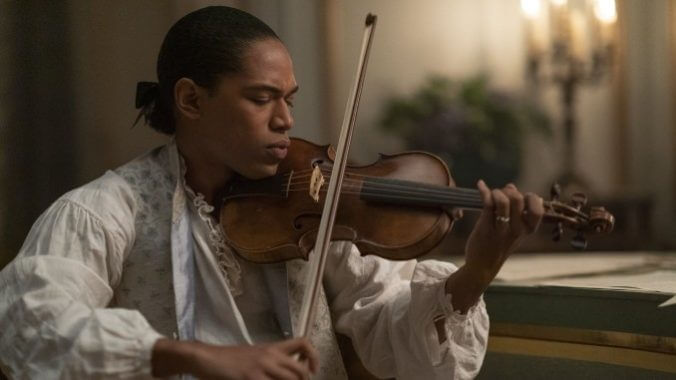Period Biopic Chevalier Too Carefully Toes Its Line

Like the France in which it is set, Chevalier has a bit of a class problem. Stephen Williams’ melodic motion picture about Joseph Bologne, Chevalier de Saint-Georges—the biracial virtuoso who took Paris by storm in the late 1700s—is a moving portrait of an unheralded figure that barely crescendos beyond a basic portrait. While there are glimmers of grace notes that suggest a complex life that challenges our assumptions of the past, Chevalier keeps to an otherwise standard period biopic meter.
We follow young Saint-Georges (Kelvin Harrison Jr.) from the moment his aristocratic father abandons him at a boy’s school, leaving him an outcast with only his musical talents as means of escape. Those gifts take him far and quickly—all the way to the court of Marie Antoinette. He rubs shoulders with some of the great stars in the continental music scene; co-celebs like Mozart, Marie-Madeleine Guimard (Minnie Driver, in her triumphal return to period Paris opera costume) and Christoph Willibald Gluck were his rivals. But he bested them all. As revolutionary sentiment rises in France, Saint-Georges finds himself at a crossroads, torn between loyalty to his benefactors and the ideals of liberty and equality he believes in. His journey to being The People’s Composer will risk everything he has—his love, connections, and identity.
It’s clear that everyone involved with Chevalier is excited to tell this story. Oliver Garcia’s costumes are elegant but worn. Jess Hall’s cinematography is candlelit and smoky, which casts the subdued baroque interiors of Karen Murphy’s production design in delicate shadow. It’s a vignetted 18th century, perhaps a bit sanitized around the edges, but it sets the intimate mood Williams hopes to achieve.
This is a period film in which the design was meant not to overtake performance. Chevalier’s focus is on the inner life of Saint-Georges more than his social or historical one. Harrison Jr. does a marvelous job, able to present the restraint and decorum that Saint-Georges had to put on as part of a costume. When his mother arrives suddenly, freed from Guadeloupe after his father’s death, Saint-Georges must face his parentage and privilege. You can see the conflict written across Harrison’s face. Without saying the word, you can tell his character is thinking and computing race. Saint-Georges lived in a world deeply permeated by respectability politics avant la lettre. Harrison Jr. makes these connections, creating a performance bridging past and present.
Were it that the rest of the film was as invested in bridging history. Chevalier has been marketed as a moment of uncovered history—of representation that matters. And to some extent, the folks at Fox Searchlight are correct. Saint-Georges’ story is a stark reminder that the European past was way more diverse than is commonly thought of in our popular imagination. But when it comes down to showing the nitty gritty of Chevalier’s unique confluence of historical identities, Williams and screenwriter Stefani Robinson are shy. The racism he encounters is typical sensational Hollywood: Being roughed up by school gangs and cops; being denied the chance to marry his true love Marie-Josephine (Samara Weaving, in an incredibly turned-on performance). All these are true, real and ongoing, but they’re two-dimensional, shorthand to state the obvious truth that 18th century France was anti-Black. It doesn’t tell us much about Chevalier’s unique battles in his time.
We’ll get close. Saint-Georges explains to Marie-Josephine that he cannot marry her or any other aristocrat because it’s illegal for different races to marry, but it’s also illegal for him to marry outside of his class without giving up his title and income. It’s an exciting confluence of class and miscegenation laws that we often don’t consider, yet it’s still a monologue that wouldn’t be out of place in any period piece. Saint-Georges is made a moniker of France twice in the film, representing the benefits and limits of so-called “civilization.” At first, he’s paraded as an example of French civilization’s ability to “elevate” other races out of their “primitive state.” Yet, in the end, that same logic comes back to deny him entrance into the art establishment because he is not, and never will be, fully “human.”
-

-

-

-

-

-

-

-

-

-

-

-

-

-

-

-

-

-

-

-

-

-

-

-

-

-

-

-

-

-

-

-

-

-

-

-

-

-

-

-








































